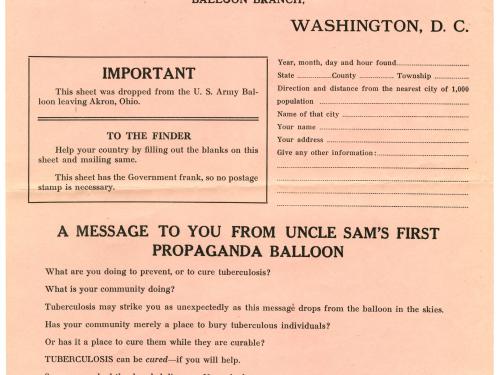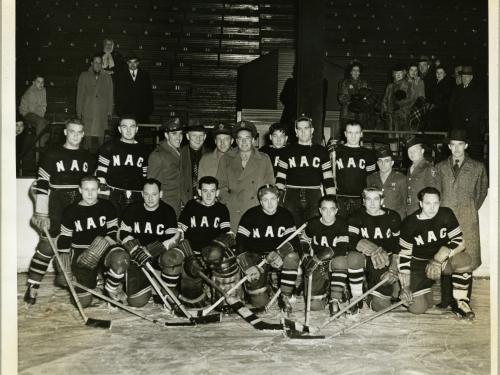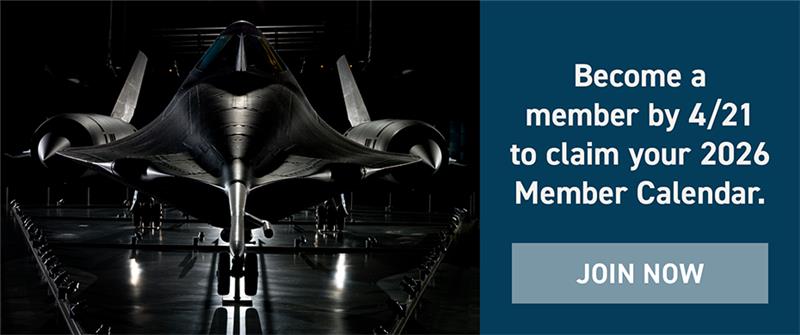
Story
Documented in our National Aeronautic Association collection is the 1961 All Woman’s International Air Race that ended in Nassau, Bahamas on May 29.

Showing 61 - 70 of 144

Story
Documented in our National Aeronautic Association collection is the 1961 All Woman’s International Air Race that ended in Nassau, Bahamas on May 29.

Story
Women’s History Month in the United States began as Women’s History Week in 1982. The event was expanded to the entire month of March in 1987. Throughout the past month, the Smithsonian Institution and the National Air and Space Museum, have sponsored many events for Women’s History Month. On March 28, 1988, just the second official Women’s History Month, an all-female Air Force flight crew flew a Lockheed C-5 Galaxy across the Atlantic Ocean to commemorate the month.

Story
Our Archives houses the Technical Reference Files, an important collection of aeronautical and astronautical topics comprised of 1,920 cubic feet of documents, photographs, and ephemera. This important resource is housed in vertical files and is an organic, growing collection to which material is added constantly. Recently, we came across a remarkable document in the Tech Files of the long fight against tuberculosis—shared with you today in recognition of World Tuberculosis Day.

Story
In 1962, young Linda Halpern decided to fulfill a school assignment by inquiring about how she could pursue a dream. Required to write a letter for a grade-school class, Ms. Halpern addressed hers to President John F. Kennedy, asking what she would need to do to become an astronaut.

Story
Almost a year ago, the Museum announced that it had acquired papers and artifacts of Arthur C. Clarke (1917-2008), renowned science fiction author and futurist. Now we can share that the Archives has completed processing the collection and it is open for research. As we discussed in blogs last year, Clarke was a seminal figure of the 20th century, with his influence still evident in today’s science fiction literature; in the continuing, lively cultural interest in futurism; and, of course, in movies. His collection does what we hope for from any collection of a well-known, highly accomplished individual: to see into his or her processes of creativity and the network of family, friends, and peers that shaped their world.

Story
Through the history of aviation, pilots have worn many types of helmets. Exhibits at the National Air and Space Museum range from Paul Studenski's 1912 era leather flying helmet, to Apollo Soucek's furry helmet, to Mike Melvill's SpaceShipOne helmet. Today, however, in honor of Super Bowl 50, we will remember Robert "Bob" Eucker's football helmet.

Story
Theodore E. Boyd was a 24-year-old teacher from Tennessee when the United States entered World War I in 1917. Boyd initially volunteered for Reserve Officers Training School at Fort Oglethorpe, Georgia. He then accepted a commission to be a Second Lieutenant in the Field Artillery Section. In France, Boyd served with the 88th Aero Squadron (Attached), 7th Field Artillery, Air Service, American Expeditionary Forces (AEF). In 2012, the National Air and Space Museum Archives received the Theodore E. Boyd World War I Collection (Acc. No. 2013-0016), and through the documents in the collection—correspondence, photographs, military orders, flight logs, and memoirs—we can reconstruct Boyd’s World War I experience.

Story
One of my biggest joys of the winter season is receiving holiday cards from my friends and family. On the other hand, I am terrible about sending cards myself. Imagine being Dick Konter, who had promised over 800 people that he would write to them while on a polar expedition to Antarctica!

Story
Many families have their own Thanksgiving traditions that they faithfully recreate each November—Grandma’s stuffing, Aunt Jean’s serving platter, homemade cranberry sauce, or an insistence upon the canned sauce with ridges. After the meal, it may be nap time or football time. But the most common tradition is cooking and eating a big, fat Thanksgiving turkey. The collections in the National Air and Space Museum Archives provide a cornucopia of images and information on the history of aviation and spaceflight, some with moments of Thanksgiving cheer.

Story
This summer, I took myself out to the ball game, spending hours at Camden Yards and Nationals Park, with quick side trips to Fenway Park and U.S. Cellular Field (part of me will always believe the White Sox still play at Comiskey).
